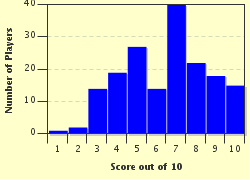Quiz Answer Key and Fun Facts
1. Sociolinguistics is most appropriately defined as which of these?
2. The linguistic term "code-switching" refers to which of the following?
3. A person who speaks three languages fluently is most properly referred to by which of these terms?
4. Which of the following would NOT be considered a part of sociolinguistics?
5. Which of the following is NOT a dialect of English?
6. Which of the following languages was not widely spread as a result of colonialism?
7. While the United States has no official language, the de facto language of government is English. Of the following, which is the closest to the number of languages spoken as a native language (mother tongue) by natural-born citizens of the United States?
8. English is most closely related to which of the following languages?
9. To what does the term "lingua franca" refer?
10. "Pidgin" most closely refers to:
Source: Author
innate13
This quiz was reviewed by FunTrivia editor
looney_tunes before going online.
Any errors found in FunTrivia content are routinely corrected through our feedback system.


